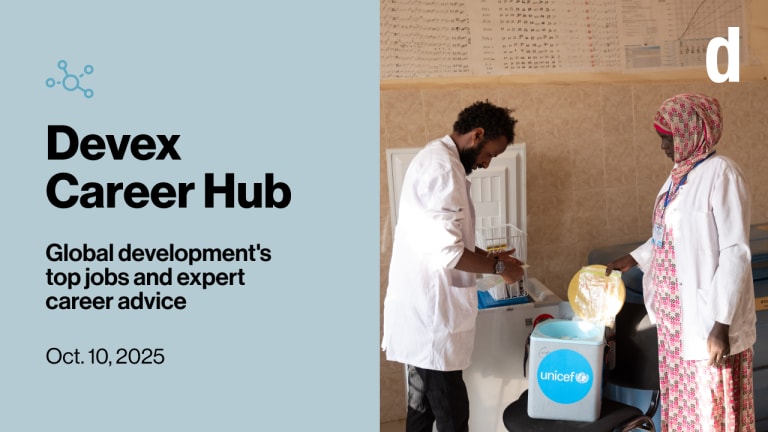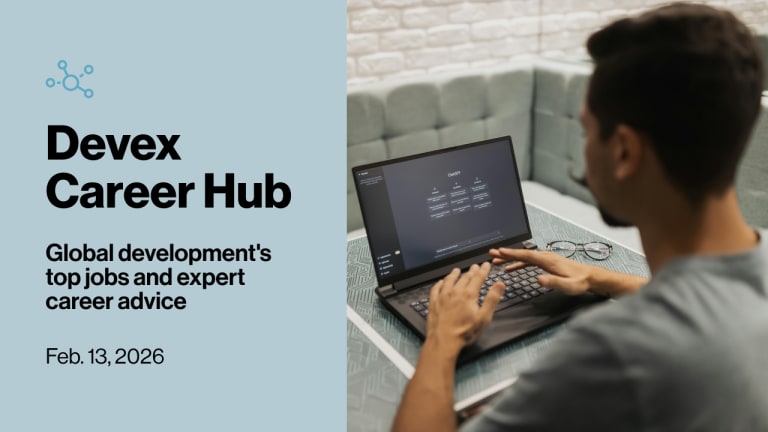Globaldev careers: The technical adviser
Molly Schneider from the International Rescue Committee discusses the role of a technical adviser in global development programming and the skills needed to succeed.
Molly Schneider is a technical adviser for rural livelihoods at the International Rescue Committee, a role that is similar in function to a program officer at many other organizations in bringing technical expertise to program development, grant applications, trainings, and projects. Schneider is the focal point for country programs in Africa’s Francophone Great Lakes region and the Sahel region of West Africa. Depending on the country, she supports a range of emergency and recovery programming, which can cover anything from cash support and market systems development to urban-based employment. She served with the Peace Corps and completed a master’s in development practice before spending time in Zimbabwe and Ethiopia. Upon landing a role with IRC, she had to build knowledge and capacity around the humanitarian space, as well as its principles and interventions. Schneider tells Devex about the technical skills that have helped her succeed and the challenges of juggling multiple programs. This conversation has been edited for length and clarity. What does your average day look like? It can vary a lot because the breadth of responsibilities for my position is so multifaceted, but a regular day consists of a check-in call with my coordinators who are based in our field offices. So whatever country I'm supporting, [I’m] checking in on project or program progress, addressing any specific challenges or needs, brainstorming about future opportunities. Then [I do] maybe one or two concept notes or proposal reviews … an hour or two of looking at blogs and networks related to agricultural and rural livelihoods, reading new reports, maybe attending a webinar, and then maybe having an external meeting with a donor or a potential partner. “When I do informational interviews with people that are interested in working for IRC in a technical role, I always tell them ... ‘Go to the field and get as much experience as possible.’” --— Molly Schneider, technical adviser for rural livelihoods, International Rescue Committee What are some of the challenges you face in your role? Being a TA that covers multiple different countries and contexts, it's very different from being staff in one of those countries and having really in-depth knowledge about what's going on in a specific area. I think, while it's very beneficial for me to have a global perspective of everything that we do and bring new ideas to the various country programs I support, it's also difficult to juggle between so many. [For example], one hour I’ll be focusing on DRC [the Democratic Republic of Congo], the next hour focusing on Niger, the next hour on Afghanistan. So [the challenge] is juggling around and making sure that you have enough information to contribute meaningfully based on the context and everything that's happening. How do you see the impact of your work? I see the biggest impact when I work together with my colleagues ... to look at ways in which we can adapt our programming by innovating or bringing in new types of activities, or where I'm really working together with our staff in the field to look at ... what we could be doing that would make a greater impact, specifically around market systems development [and] resiliency. When we're able to brainstorm those ideas, get them funded, and then implement them and see positive results, that for me would be very meaningful and successful. Is there a particular highlight of your career that stands out? At IRC, being traditionally a humanitarian organization, we often shy away from those big USAID [United States Agency for International Development] and DFID [Department for International Development] proposals, but last year I supported our Niger and Burkina [Faso] country programs to bid on a $35 million USAID multicountry project. It was definitely new territory for us, [and] we ultimately were unsuccessful with the proposal, but it was further than we had ever gotten before for these countries with this sort of opportunity. So that experience was not only a learning opportunity for myself but also for the IRC in general. Even though we didn't win this opportunity, the work that we did to prepare for the proposal ended up having a lot of positive effects on our programming in Niger and Burkina Faso through new partner identification and developing new ideas and concepts which we're now using in other opportunities. More recently, given the severely negative impacts of COVID-19 on food security and a lot of the areas where we work, myself and a few colleagues have been working with some of our country programs to do seed system security assessments ... to figure out ways in which we can support market actors [and] promote seed savings and more resilient, robust local seed systems in order to reduce the need for humanitarian assistance. One sort of positive impact of the negative food security situation as a result of COVID is that it has really pushed us to look at how we can promote more resiliency in the areas where we work. What skills have been most valuable or have you focused on to succeed in this role? There's the operational skills that are really important for anyone that is working in my role — how to write a concept note, how to write a proposal, how to really tell a story that is attractive to donors, as well as things like how to develop the logframe [logical framework] and what sort of indicators are appropriate. I think a good understanding of monitoring and evaluation and impact evaluation is super important as well. You don't have to be an expert, but you need to be able to understand the language of people that are doing those things for you so that you're able to take the results and meaningfully do something with them. On the technical side, for rural livelihoods and agriculture, definitely understanding basic agricultural production systems, understanding climate-smart agriculture, and all of the things that you can do to make climate-adapted and climate-smart programs. ... Then, working within the humanitarian space generally, [knowledge of] cash programming is really important … having a basic to moderate understanding of how that works and how you would advise on programming for that. What advice would you give to someone pursuing this type of role? I think that for my position, and especially when I do informational interviews with people that are interested in working for IRC in a technical role, I always tell them ... if they're American or European, “Go to the field and get as much experience as possible.” So [it’s] not just going to school in New York or London and then being able to transition in [to the sector]. I think also understanding not only one sector very specifically ... but being able to have a general overview of all of the different types of programming that happen. Just because I'm on an agricultural team doesn't mean that I'm only doing agriculture all day, every day. There's a lot of intersections with governance programming, health programming, gender-based violence programming. I think having a general understanding of a lot of the major topics within development or humanitarian programming is also very important. A lot of the major development-focused graduate programs try to give that more holistic review.
Molly Schneider is a technical adviser for rural livelihoods at the International Rescue Committee, a role that is similar in function to a program officer at many other organizations in bringing technical expertise to program development, grant applications, trainings, and projects.
Schneider is the focal point for country programs in Africa’s Francophone Great Lakes region and the Sahel region of West Africa. Depending on the country, she supports a range of emergency and recovery programming, which can cover anything from cash support and market systems development to urban-based employment.
She served with the Peace Corps and completed a master’s in development practice before spending time in Zimbabwe and Ethiopia. Upon landing a role with IRC, she had to build knowledge and capacity around the humanitarian space, as well as its principles and interventions. Schneider tells Devex about the technical skills that have helped her succeed and the challenges of juggling multiple programs.
This article is exclusively for Career Account members.
Unlock this article now with a 15-day free trial of a Devex Career Account. With a Career Account subscription you will get:
- Full access to our jobs board, including over 1,000 exclusive jobs
- Your Devex profile highlighted in recruiter search results
- Connections to recruiters and industry experts through online and live Devex events
Start my 15-day free trialAlready a user?
Printing articles to share with others is a breach of our terms and conditions and copyright policy. Please use the sharing options on the left side of the article. Devex Pro members may share up to 10 articles per month using the Pro share tool ( ).
For four years, Emma Smith covered careers and recruitment, among other topics, for Devex. She now freelances for Devex and has a special interest in mental health, immigration, and sexual and reproductive health. She holds a degree in journalism from Glasgow Caledonian University and a master’s in media and international conflict.








